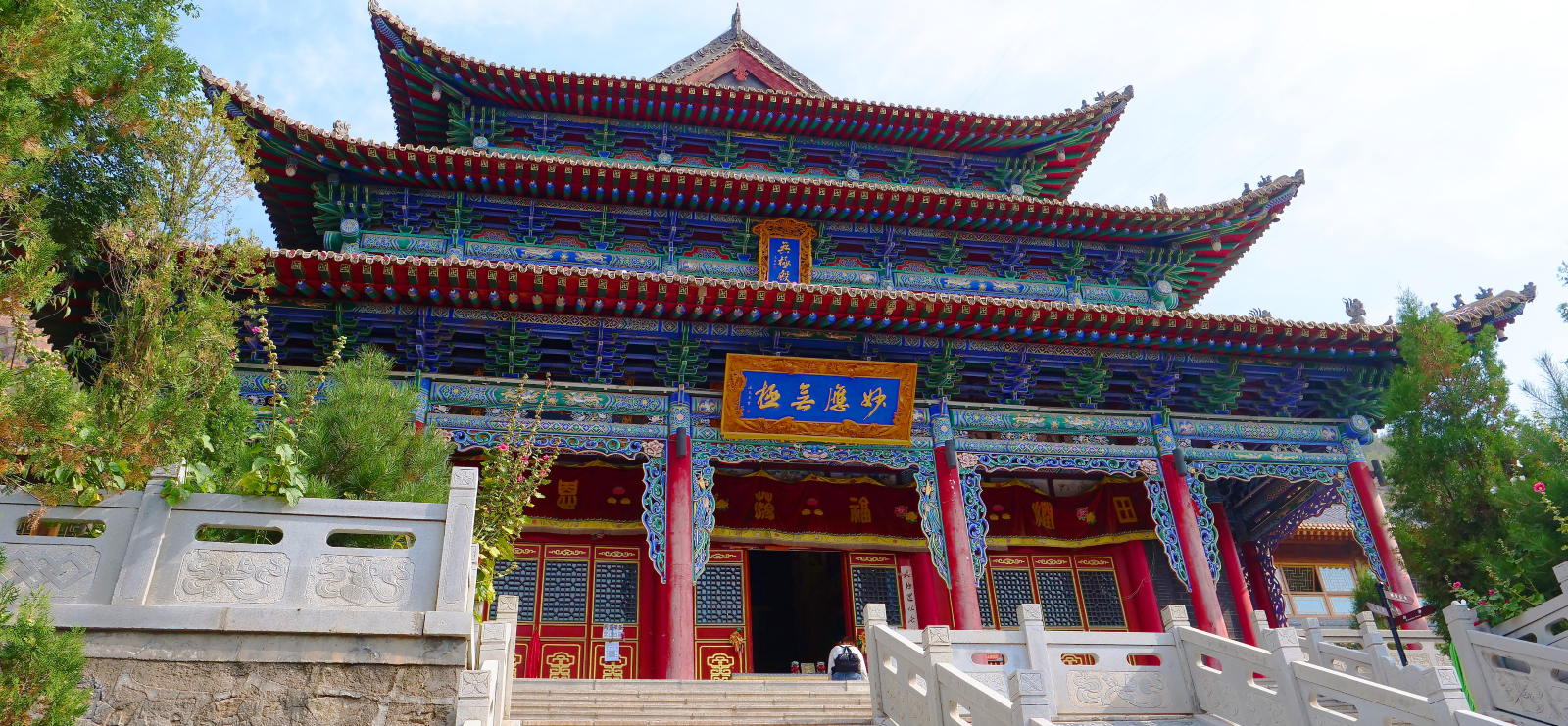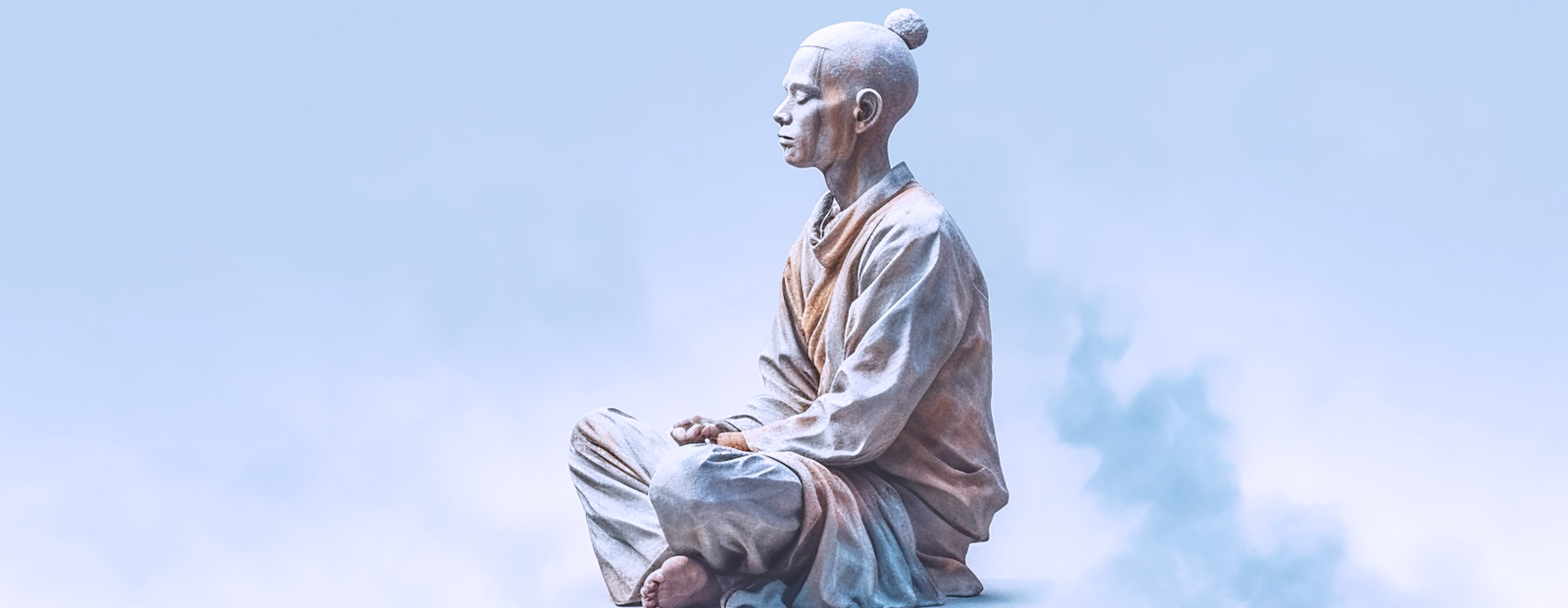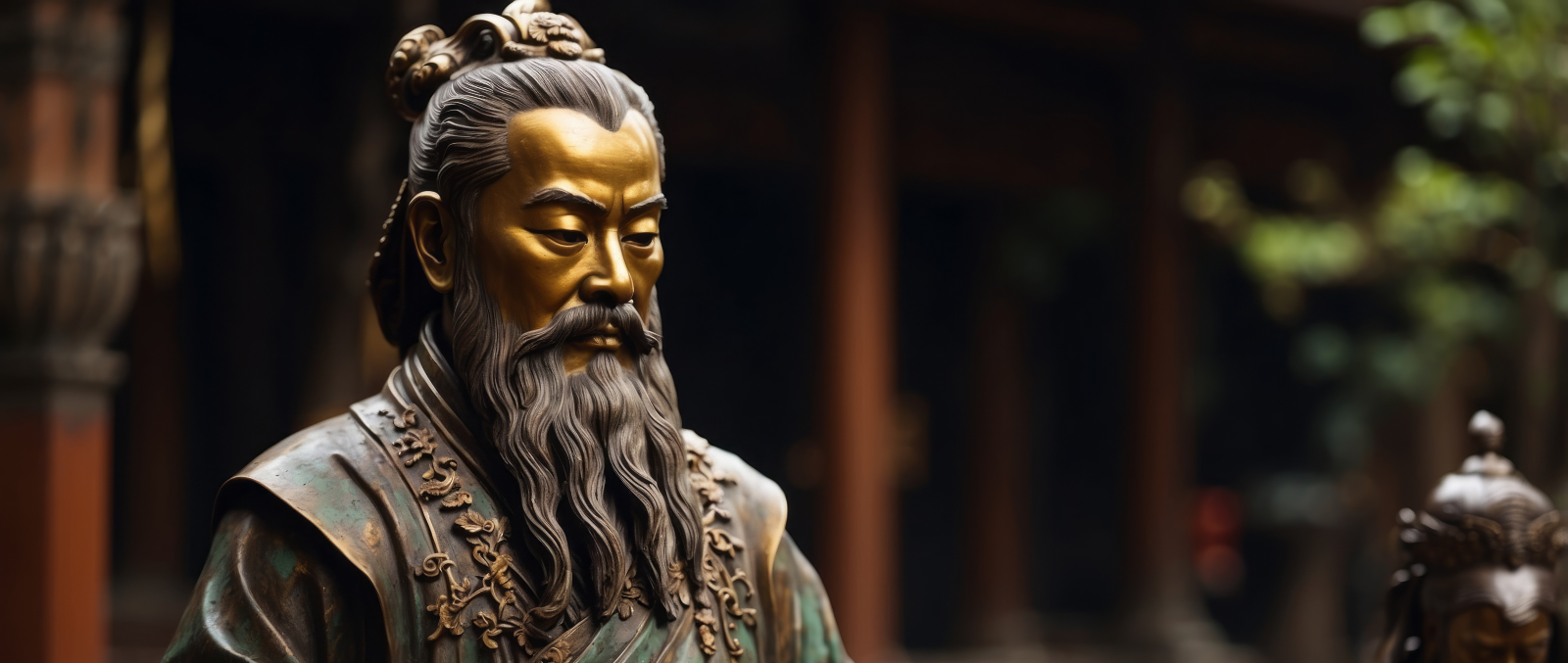You have found the home of the dao. Tao which is actually pronounced as “dow” is translated to mean the way or path in English. Tao in reality is not so easily definable. The Doa is the power of the universe that encompasses and moves through all things, both living and non-living. The Tao stands for balance and shows the harmony of opposite sides, such as light and dark, love and hate, male and female.
What is Taoism?
More a philosophy than a religion, Taoism is concerned with finding a balance between the way we live our lives and the demands life places on us. Translated literally as ‘The Way’, following the Tao means practicing a form of ‘minimal’ action called the ‘wu wei’. This is described in Taoism as the practice of going against the stream not by struggling against it and thrashing about. By standing still and letting the stream do all the work. Thus the sage knows that relative to the river, he still moves against the current.
To the outside world the sage appears to take no action, but in fact he takes action long before others ever foresee the need for action. In other words, Taoism is a form of passive resistance, of making sure you are prepared for every eventuality and going with the flow as things happen.
Tao is the first-cause of the universe. It is a force that flows through all life.
“The Tao surrounds everyone and therefore everyone must listen to find enlightenment.”
Each believer’s goal is to harmonize themselves with the Tao. Taoism has provided an alternative to the Confucian tradition in China. The two traditions have coexisted in the country, region, and generally within the same individual. Priesthood views their many gods as manifestations of the one Dao, “which could not be represented as an image or a particular thing.” The concept of a personified deity is foreign to them, as is the concept of the creation of the universe. Thus, they do not pray as Christians do; there is no God to hear the prayers or to act upon them. They seek answers to life’s problems through inner meditation and outer observation. Read more at the taosexperience blog.
Some of the basic tenets of Taoism are the following:
- Time is cyclical, not linear as in Western thinking.
- Taoists strongly promote health and vitality.
- Five main organs and orifices of the body correspond to the five parts of the sky: water, fire, wood, metal and earth.
- Each person must nurture the Ch’i (air, breath) that has been given to them.
- Development of virtue is one’s chief task. The Three Jewels to be sought are compassion, moderation and humility.
- Taoists follow the art of “wu wei,” which is to let nature take its course. For example, one should allow a river to flow towards the sea unimpeded; do not erect a dam which would interfere with its natural flow.
- One should plan in advance and consider carefully each action before making it.
Understanding Taoism’s Timeless Wisdom
The Natural Flow of Compassion
At its heart, Taoism embraces the natural compassion within us all. A Taoist extends kindness to others not with expectation of reward, but from a deep understanding that compassion flows naturally when we align with our true nature. This reciprocity isn’t calculated, but emerges organically from living in harmony with the Tao.
“People are compassionate by nature,” teaches Taoism. “Left to their own devices, they will show this compassion without expecting anything in return.” This perspective sees kindness not as a learned behavior but as our default state when artificial constraints are removed.
Wisdom That Nourishes
This wisdom echoes in the famous teaching often attributed to Lao Tzu: “If you give a hungry man a fish, you nourish him for a day. If you teach him to fish, you nourish him for life.” The principle reveals how sustainable compassion creates lasting change rather than temporary relief—a profound insight into how true kindness looks beyond immediate solutions.
A Universal Philosophy
Today, Taoism transcends boundaries of language and culture, practiced across the globe by those seeking harmony with the natural world. Its universal appeal lies in its simplicity and profound insights into human existence. Regardless of nationality or background, practitioners find common ground in its teachings about alignment with nature’s rhythms.
The Enlightened Master’s Final Lesson
Consider the story of the enlightened Taoist master. After decades of inner work, he achieved ultimate understanding of the Tao’s true nature. As he lay dying, disciples gathered around his bed, eager for his final wisdom. “Master, what is the true Tao?” they asked. The old man opened his eyes, smiled gently and replied, “The true… is true,” before peacefully passing away. His deceptively simple answer embodied the essence of Taoist wisdom—truth exists beyond elaborate explanations.
The Way of Wu Wei
Alongside Confucianism and Buddhism, Taoism stands as one of ancient China’s most influential philosophical traditions. Its essential principle of “Wu Wei” (often mistranslated as “No-Do”) represents not passivity but rather natural action—moving through life without forcing or interfering with the natural flow of events. This concept encourages us to act in accordance with our authentic nature rather than struggling against the current.
Finding Harmony in Simplicity
Taoism invites us to find our unique way within the greater whole, seeking harmony between people and with the universe itself. It encourages simplicity over complexity, suggesting that scientific progress and material accumulation often separate us from our essential nature. For Taoists, the person who drinks water from cupped hands may be closer to wisdom than one who requires manufactured vessels.
Returning to Authenticity
The true Taoist understands that sometimes the most profound wisdom lies not in adding to our lives, but in returning to our most authentic, natural state of being. This return doesn’t reject the modern world entirely, but rather maintains a conscious relationship with it—recognizing when technology and material pursuits help or hinder our connection to the Tao. Through this discernment, we discover that the path to enlightenment often involves shedding accumulated layers rather than acquiring new knowledge.
Finding Harmony with Nature
The Ultimate Purpose
The goal of Taoism is to conform to the ways of nature and achieve fusion with the Whole. Taoists believe that strict rules of discipline, whether personal or governmental, are artificial constructs that distort human nature and separate us from the natural balance of yin and yang. These imposed structures create barriers between ourselves and our authentic connection to the universe.
The Ineffable Tao
In the profound work of Lao Tzu, Taoists discovered this essential truth: “The Tao that can be known is not the eternal Tao. The substance of the World is just a name for Tao. Tao is all that exists and may exist. The universe is only a map of what exists and can exist.” This reminds us that true understanding lies beyond intellectual comprehension.
Dual Experience
The experience of Tao involves transcending ego to sense the universe directly and gaining wisdom to understand it. These two types of experience form the path within Taoism. They manifest differently in each person, yet neither experience fully conveys the Tao itself, which remains infinitely greater and more subtle than the World we perceive.
Core Virtues of the Sage
Being Honest Prevents Deception. Not Putting A Value on Things Prevents Loss. Not Flaunting Beauty Prevents Lust.
So the sage governs people by: Emptying their hearts, filling their bellies. Weakening their ambition and strengthening their bodies. When people lack excessive knowledge and desire, even the most skilled manipulator cannot control them. By avoiding unnecessary action, all can live peacefully together.
The Boundless Nature
We must remember that Tao is a depthless vessel. Used by itself, it is never filled. The universe cannot be cut, knotted, dimmed, or stilled. Its depths remain hidden, ubiquitous, and eternal—we know not from whence it came, as it existed before Nature itself.
Embracing the Way
Embracing the Tao, you will be embraced in return. Easily, smoothly, you will be reborn. Clarify your vision, and you will be enlightened. Feed your compassion, and you will become impartial. Open your heart, and you will be accepted. By accepting the universe, you embrace Tao—sustaining and nurturing, creating but not owning, giving without demanding, guiding without controlling.
This is the virtue.
Formless Power
The Tao has no form or spirit and cannot be seen or heard, yet its application is inexhaustible. While offering music and food might attract strangers temporarily, aligning with the Tao will bring the people of the universe to keep you in safety, health, companionship, and peace.
Paradoxical Wisdom
He who seeks knowledge acquires as much as possible every day. He who follows the Tao loses as much as possible each day. By reaching a state of non-action, doing nothing, nothing remains undone.
Nature as Teacher
Ultimately, say the Taoists, the fundamental virtues are peace, repose, and silence. Their model is nature, which serves as an excellent example for humanity, since nature does not prolong storms or hurricanes indefinitely. The essential principle of Wu-Wei (Non-Doing) doesn’t advocate passivity but rather avoiding unnatural acts. It suggests spontaneity—allowing things to take their natural course, flowing without forcing actions or interfering with natural development.
Everything that happens is part of the Tao, and every human being should seek their way within it. Taoism yearns for harmony between people and between humanity and the All—a state of perfect balance with the universe itself.

Qingchen Shan Mountain And Home Of Taoism
The Holy Place
Qingcheng Shan stands as a holy Taoist mountain, an early home to Taoism and its teachings dating back to approximately 100 AD. For any student or believer in Taoism, visiting this sacred site becomes both a revelation and catalyst for deeper understanding. After the public bus ride from Chengdu, visitors enter a naturally serene and tranquil setting adjacent to the vast and extremely fertile Chengdu Plain and the UNESCO World Heritage listed Dujiangyan Irrigation Project, which still services around one million acres of farmland.
Natural Harmony
The Qingcheng Shan Taoist temples nestle amongst towering cypress pine, plum, and ginkgo trees, dramatic escarpments, sweeping ridges, and cascading streams. This area is naturally blessed with reliable rainfall, fertile soils, and an ambient climate—likely temperate in nature and conducive to sustained lush vegetation growth, earning the mountain its name: “green place.”
Three Essential Words
The mountain impresses visitors with its profound sense of tranquility, inspiring three fundamental Taoist concepts: Abundance, Sustenance, and Harmony. These words represent a place at one with nature, embodying balance and stability. Although a major earthquake in 2008 virtually destroyed many of the mountain’s ancient structures, its spiritual essence remains intact.
Walking in Ancient Footsteps
Pilgrims come to see firsthand what ancient Taoists witnessed in this landscape about one thousand years before. They too would have embraced nature’s willingness to envelop them and sustain them in its simplicity. Those early Taoists didn’t seek to impose themselves on the landscape but instead remained within its bounds—this forms the core of true Taoist beliefs and the principle of acceptance. They respected nature in this place because it provided what they needed without excessive effort or need for change.
Beyond Western Misunderstanding
Walking up many steps and meditating upon a perched lake, some modern visitors with Western logic might mistakenly think, “They were lazy people.” This perspective shows disrespect by making broad assumptions about people who began inhabiting these mountains two thousand years ago. Perhaps the forest itself was writing those ancient Taoist principles, and the practitioners simply accepted and tolerated rather than seeking to foster change—which would have required different energies than those they chose to follow.
If the season was abundant, they flourished; if not, they suffered alongside the animals and plants of the landscape, accepting nature’s cycles. The Mountain possessed a special energy and could provide what the Taoists sought. Nature was there to do their bidding, and they were grateful recipients.
The Middle Way
To modern observers, the Taoists might seem unwilling to touch, transform, or take from nature. While contemporary society might label them extremists, here they simply follow the “middle way.” Perhaps this concept emerged from the necessity to survive within natural boundaries while transferring knowledge to create something more sustainable, such as the cultivation of rice and fruit trees.
The Flow of Qi
Great symbolism exists in the trees, their trunks and shapes, the mountain slopes, and the movement of water flowing through the landscape. The Qi (Chi energy) flows from the mountain peaks and slopes to the plains, while water from the mountains provides life force as essential as the air we breathe. The Feng Shui of the mountain relies on its gentle folding into the Chengdu plain. The mountain’s Qi manifests in its clean, oxygen-charged air and in the freshness and purity of water flowing from springs within.
Three Words of Wisdom
The three words—abundance, sustenance, and harmony—aptly express the essence of Taoist thought for such a sacred place. They encapsulate the philosophy’s core principles of living in balance with nature.
Experiencing the Sacred Mountain
Visitors should prepare for numerous steps, bring comfortable walking shoes, allow plenty of time, and consider taking the cable car to a viewing platform. One may notice how the Yin and Yang of the area remain in balance through the shapes and colors of all things. The mountain’s Qi descends upon visitors as they become immersed within the confines of the space, evident in the health and vibrancy of the landscapes and the movement of living things (including the trees). This place invites testing of the eight elements: light, shadow, shapes, colors, sounds, smell, movement, and temperature—noticing their presence and how they balance in their individual Yin and Yang. One becomes aware of how they harmonize with each other to form a cohesive unit of perfect balance.
The Essence of Taoism
More a philosophy than a religion, Taoism concerns itself with finding equilibrium between how we live our lives and the demands life places upon us. Translated literally as “The Way,” following the Tao means practicing a form of minimal action called “wu wei.” Taoism describes this as the practice of going against the stream not by struggling against it and thrashing about, but by standing still and letting the stream do the work. Thus, the sage knows that relative to the river, they still move against the current.
The Sage’s Wisdom
To outside observers, the sage appears to take no action, but in fact, they take action long before others foresee the need for action. In other words, Taoism represents a form of passive resistance—ensuring preparation for every eventuality and flowing with circumstances as they unfold, finding the path of least resistance while maintaining one’s essential purpose.
Core Principles of Taoism: A Guide to the Path
Introduction to the Taoist Way
Man is generally a social being who more often than not, would find a sense of purpose from his or her relationship with others and with the higher being. It is said that the purpose for which you do something will largely determine just how you do it. This principle applies to life itself—the purpose and belief by which you live will determine the quality of life that you experience. Taoism offers a “path” in life, providing both purpose and guiding principles for believers. Below is a summary of the fundamental principles that form the foundation of Taoist philosophy.
Tao: The Universal Way
Analysts have noted that Tao promotes principles consistent with natural laws. This observation aligns perfectly with Taoist thought. After all, the Tao principles describe the essential way that every person needs to follow. This principle attempts to answer questions about the fundamental force behind the universe—explaining what is and what is not. According to this principle, energy (qi) and its flow direction determine the state of being for both the universe and the individual. If you seek peace in your life, applying this principle of Taoism becomes essential.
The Tao represents the underlying pattern and substance of the universe—a force that cannot be fully grasped by intellect alone but must be experienced through intuitive wisdom. It flows through all things, connecting them in a vast web of interdependence. Understanding the Tao means recognizing that all opposites are complementary aspects of a greater whole.
De or Te: The Way Through Virtue
This principle stipulates how to activate the Tao principle in daily life. It emphasizes the need to tap into Taoism’s power through humility and integrity. As a way of life, De teaches that actively pursuing the Tao principle is the only way to realize its power. By cultivating virtuous qualities that align with nature’s patterns, one develops the ability to live in harmony with the Tao.
De represents the manifestation of Tao in the individual—the personal expression of cosmic harmony. Through cultivating simplicity, compassion, and moderation, practitioners develop a character that naturally aligns with universal principles. This virtue arises not from forced morality but from alignment with one’s true nature.
Wu Wei: Efortless Action
Translated directly, Wu Wei refers to “effortless doing.” This means that as a Taoism believer, one need not force things to go their way. This differs significantly from most principles applied in Western thought. Compared to principles such as capitalism—which may encourage taking advantage of others and using all available means to achieve goals—a Taoist is not expected to fight to make things work according to personal desire. Instead, one surrenders to the higher powers that ultimately control human events. This ability to surrender to the universe’s power leads to a profound sense of peace.
Wu Wei does not mean doing nothing, but rather acting without strain or struggle—moving with the natural current rather than against it. By understanding the inherent patterns in situations, one can accomplish much with minimal effort. The sage achieves great things by allowing them to unfold naturally rather than through force or manipulation.
P’u: Embracing Simplicity
This principle of Taoism emphasizes the need for simplicity and inner peace. P’u, translated as “uncarved block,” stresses the importance of maintaining pure perception of events. A Taoist accepts nature’s control without attempting to impose artificial meanings beyond what is visible. A believer surrenders to and accepts the outcomes determined by natural forces. Therefore, to such a practitioner, there is never anything truly “beautiful” or “ugly”—everything simply is, and in that existence, everything possesses its own form of beauty.
P’u represents a return to our original nature—uncomplicated, receptive, and without prejudice. Like an uncarved block of wood that contains infinite potential, the mind that maintains simplicity can adapt to any situation. By clearing away preconceptions and judgments, we see reality more clearly and respond to it more effectively.
The Integrated Taoist Life
These principles work together to create a holistic approach to living. By understanding the Tao, cultivating Te, practicing Wu Wei, and embracing P’u, practitioners develop a balanced relationship with themselves, others, and the natural world. This integration leads to a life of reduced struggle, increased harmony, and deeper satisfaction—not through acquiring more, but through aligning with the natural order of existence.
The Taoist path offers an alternative to the striving and conflict that characterize much of modern life. By following these principles, one discovers that true fulfillment comes not from imposing one’s will upon the world, but from finding one’s place within it.
Confucianism and Taoism: Ancient Rivals in Chinese Philosophy
Two Paths to Harmony
Confucianism and Taoism have been the most influential philosophical traditions in Chinese societies for centuries, and their impact remains evident throughout East Asian countries today. Though emerging from the same cultural matrix, these traditions represent fundamentally different approaches to understanding humanity’s place in the cosmos.
The Taoist Critique
Taoism views Confucianism with suspicion for its rational approach toward societal progression through moral values. According to Taoist philosophy, maintaining universal balance requires societies to follow nature’s inherent principles rather than imposing artificial structures. Taoism emphasizes peace, vitality, flexibility, honorable communication, and actions guided by natural wisdom rather than intellectual constructs.
Historical Development
Taoism emerged after Confucianism had already established itself as a dominant philosophy. Certain philosophers who had studied Confucian social and moral values identified what they perceived as significant omissions in its worldview. Initially, Taoism sought to supplement Confucianism with additional moral insights but eventually diverged dramatically, moving away from Confucianism’s educational and prescriptive aspects.
The Meaning of Tao
“Tao” translates as “the right path” or “channel,” and its adherents believe that for genuine human flourishing, Taoism offers the superior approach because it maintains close alignment with nature. Unlike Confucianism, it doesn’t attempt to reshape individuals according to predetermined ethical models or impose changes on their natural temperaments and tendencies.
Lao Tzu’s Natural Way
Lao Tzu, Taoism’s founder, emphasized that nature represents one of the universe’s three fundamental forces—alongside expansive and contractive energies. He maintained that nature’s way remains unchanging and eternal. This contrasts sharply with Confucianism’s perspective that humans possess wisdom and must fully utilize their intellectual capacities to determine appropriate behavior. The Confucian view holds that the human mind exists not merely to follow established patterns but to observe thoughtfully and make independent judgments.
Opposing Visions of Human Nature
According to Confucianism, while individuals possess innate virtuous tendencies and natural honesty, these qualities alone don’t guarantee success in society. Cultivation and education become essential to develop one’s potential fully. This directly contradicts the Taoist belief in the sufficiency of natural inclinations when allowed to express themselves without interference.
Philosophical Incompatibility
From analyzing both philosophical traditions, it becomes evident that these two systems cannot easily coexist within the same social framework. They represent opposing approaches to virtually every aspect of human existence. While critics acknowledge the importance of both philosophical models, individuals must ultimately make decisions about how to live in ways beneficial both for themselves and others.
A Critical Assessment
Different philosophical lenses reveal different truths, but from a practical perspective, Confucianism arguably provides a more comprehensive societal approach for shaping human moral values. Confucianism offers purpose to lives and meaning to survival through its emphasis on relationships, ritual, and social responsibility. Understanding right and wrong requires careful consideration of specific societal needs and contexts—an area where Taoism’s rejection of social engineering may seem inadequate compared to Confucianism’s systematic ethical framework.
Beyond Simple Opposition
Despite this apparent critique, both traditions have contributed immeasurably to Chinese civilization. Rather than seeing them as mutually exclusive, many scholars now recognize how they have historically complemented each other—Confucianism governing public and social life while Taoism addressed spiritual and personal dimensions. Together, they created a philosophical balance that has sustained Chinese culture through millennia of change and challenge.
The Living Legacy
The dialogue between these philosophical traditions continues to shape thought throughout East Asia. Their enduring relevance speaks to how they address fundamental human questions about our relationship to society, nature, and the cosmos—questions that remain as vital today as when these philosophies first emerged over two thousand years ago.

Ancient Sanctuary of Taoist Wisdom
A Sacred Heritage in Chengdu
Situated in the northwestern suburbs of Chengdu, the Qingyang Gong (Bronze Goat Taoist Temple) stands as one of the oldest and most revered Taoist temples in the Chengdu region. For anyone with an interest in Taoist culture, this temple represents an essential destination—easily accessible and offering visitors a magnificent showcase of traditional architecture and intricate sculptures that embody Taoist principles and aesthetics.
Historical Evolution
During the flourishing period of Taoism in China, the temple was originally established in the Tang Dynasty (618-907 CE). However, most structures visible today were added during extensive restorations carried out during the Qing Dynasty (1644-1911). The temple’s name has an intriguing historical connection—Emperor Xizong of the Tang Dynasty reportedly sought refuge here while escaping from Chang’an (modern Xi’an). In gratitude for the sanctuary provided, he renamed the temple from its original “Xuanzhong Taoist Temple” to “Qingyang Gong.”
Architectural Treasures
The Qing Dynasty restorations enriched the temple complex with several significant structures that still stand today:
- Sanqing Hall (Three Pure Ones Hall)
- Hunyuan Palace (Primordial Palace)
- Doulao Hall (Hall of the Dipper Stars)
- Lingzu Hall (Ancestral Hall)
- Wuji Palace (Palace of Infinite Void)
- Eight Trigrams Pavilion
Among these architectural wonders, the Eight Trigrams Pavilion particularly captivates visitors with its extraordinary majesty and vibrant spiritual presence. This structure brilliantly represents the ancient Chinese philosophical concept that “the earth is square and the sky is round”—featuring a square foundation symbolizing earth, topped with a roof of colorful glazed round tiles representing heaven. Eight imposing pillars support the pavilion, each adorned with intricate dragon carvings in relief.
Sacred Artifacts
Inside the Sanqing Hall stand two remarkable bronze goats beside the altar. These are no ordinary representations—they feature fascinating composite elements from various animals, creating mythologically significant beings. According to temple lore, these bronze sculptures were transported from Beijing, adding to their historical and cultural significance.
Other notable cultural relics include the stone sculpture of Patriarch Lü Dongbin (one of the Eight Immortals in Taoist tradition) and preserved abstracts from collected Taoist scriptures that offer insights into the philosophical depth of Taoist teachings.
Living Tradition
The temple continues to function as a living center of Taoist practice and culture. Visitors particularly interested in experiencing Taoist celebrations might plan their visit to coincide with the annual fair held on the fifteenth day of the second lunar month. This festival takes place in the cultural park adjacent to the temple and celebrates the birthday of Laozi (Lao Tzu), the revered founder of Taoism.
A Gateway to Taoist Understanding
For travelers seeking to understand the profound relationship between Taoist philosophy and Chinese cultural heritage, Qingyang Temple offers an authentic glimpse into this ancient spiritual tradition. The temple’s serene courtyards, symbolic architecture, and carefully preserved artifacts create an atmosphere where visitors can connect. Experience the core Taoist principles of harmony with nature, balance between opposing forces, and the pursuit of simplicity amidst complexity.


